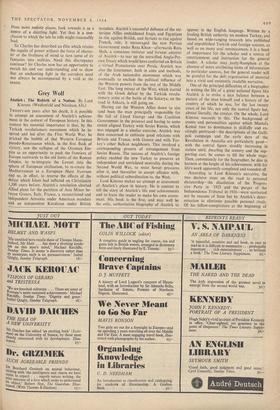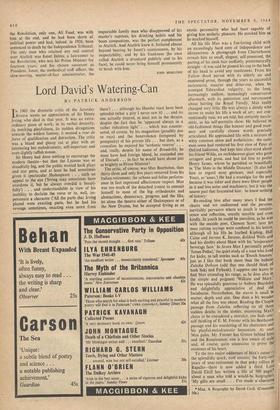Grey Wolf
TWENTY-SIX years after his death, it is possible to attempt an assessment of Atatfirk's achieve- ment in the context of European history. In this context his essential importance is that, by the Turkish revolutionary movement which he in- spired and led after the First World War, he pricked the bubble of that Western European pseudo-Renaissance which, in the first flush of victory, saw the collapse of the Ottoman Em- pire as an opportunity to push the frontiers of Europe eastwards to the old limits of the Roman Empire, to re-integrate the Levant into the sphere of European civilisation, to re-create the Mediterranean as a European Mare Nostrum and so, in effect, to reverse the effects of the defeat which Islam had inflicted on Christianity 1,300 years before. Atattirk's revolution aborted Allied plans for the partition of Asia Minor be- tween Greece, Italy, France, a reconstituted and Independent Armenia under American mandate and an independent Kurdistan under British
mandate. Atatilrk's successful defiance of the vic- torious Allies emboldened Iraqis and Egyptians to rise against British, and Syrians to rise against French, rule; it encouraged the new Persian Government under Reza Khan—afterwards Reza Shah, a conscious imitator and fervent admirer of Atattirk—to tear up the unratified Anglo-Per- sian Treaty which would have conferred on Britain a virtual Protectorate over Persia. AtattIrk was also the forerunner, both in aims and methods, of the Arab nationalist movement which was eventually to exclude the political influence of the Western powers from the rest of the Middle East. The long retreat of the West, which started with the Greek defeat by the Turkish revolu- tionary army at the battle of the Sakarya, on the road to Ankara, is still going on.
Having cut the Western Allies down to size (and been the man principally responsible for the fall of Lloyd George and the Coalition Government in the process) and having to some extent aligned Turkey with Soviet Russia, which was engaged in a similar exercise, Atattirk was then concerned to cultivate good relations with Britain and France, with Greece and with Tur- key's other Balkan neighbours. This involved a corresponding process of estrangement from Soviet Russia. The success of Atatfirk's foreign policy enabled the new Turkey to preserve an independent and unviolated neutrality during the Second World War, to resist Soviet pressures after it, and thereafter to accept alliance with, without political subordination to, the West.
Lord Kinross makes no attempt at assessment of Atattirk's place in history. He is content to tell the story of Atatiirk's life and achievements and to leave the reader to make his own assess- ment. His book is the first, and may well be the only, authoritative biography of Atattirk to appear in the English language. Written by a leading British authority on modern Turkey, and based on wide-ranging research into published and unpublished Turkish and foreign sources, as well as on many oral reminiscences, it is a book of importance for the scholar and a source of entertainment and instruction for the general reader. A scholar may justly fitomplain at the absence of notes attributing items of information to particular sources, but the general reader will be grateful for the deft organisation of material into .a vivid and eminently readable narrative.
One of the principal difficulties of a biographer in writing the life of a great national figure like Atatiirk is to strike a nice balance between a picture of the man himself and a history of the country of which he was, for the last twenty years of his life, not only the central figure but, almost literally, the creator. On the whole, Lord Kinross succeeds in this. The background of events and personalities against which Mustafa Kemal rose to dominance is skilfully and ex- citingly portrayed—the descriptions of the Galli- poli campaign and the early days of the Revolution in Anatolia are particularly good— with the central figure steadily increasing in stature until, dwarfing the scenery and the sup- porting cast, he comes to fill the whole stage. Then, conveniently for the biographer, he dies in harness at the height of his achievement, with his life's work apparently completed and rounded off.
According to Lord Kinross's narrative, the two decisive steps on the road to personal dictatorship—the dissolution of the Progres- sive Party in 1925 and the purges of the Independence Tribunal in 1926—were motivated not by reasons of State but by Atattirk's deter- mination to eliminate possible personal rivals. Of his fellow-conspirators at the beginning of the Revolution, only one, All Fuad, was with him at the end, and he had been shorn of political power and had, indeed, in 1926, been sentenced to death by the Independence Tribunal. The only man who retained any real control over Atattirk was Ismet Inanu, a late-comer to the Revolution, who was his Prime Minister for fourteen years, and his chosen successor as President. lsmet, the methodical staff officer, the slow-moving, matter-of-fact administrator, the respectable family man who disapproved of his master's caprices, his drinking habits and his boon companions, was the perfect complement to Atatiirk. And Atattirk knew it. Irritated almost beyond bearing by Ismet's cautiousness, by his respectability, and by his frankness (he once called Atatiirk a drunkard publicly and to his face), he could never bring himself permanently to break with him.
JOHN MARLOWE

































 Previous page
Previous page